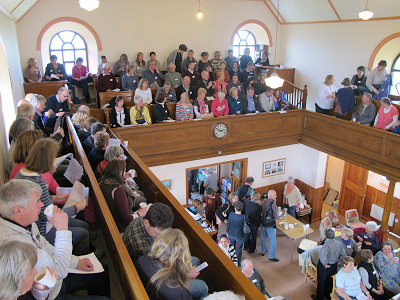Ffald-y-Brenin is the little place in Wales that's become the epicentre of a worldwide movement of blessing.
I was there with my friends Sean and Jim for the Blessings Conference where Roy Godwin presented a series of sessions on blessing people and places.
They have been learning to do this from the retreat centre at Ffald-y-Brenin and now they want to share what the Holy Spirit has been showing them.
Roy provided extensive biblical context and backup for everything he said, and all of this material was presented in written form too. I also took my own notes and I'll share some thoughts that really stood out for me.
Highlights from my notebook
The mercy and grace of Yahweh are paramount and are foundational for our lives as followers of Jesus.
Much truth about blessing has been lost and is being rediscovered.
We are to stand in his presence (Deuteronomy 10:8, Numbers 6:22-27). The priests are responsible for blessing the people. (And we are all priests under Jesus, our Great High Priest.)
Blessing is about life (it's not merely a formula).
We can only bless because we have been blessed. Out of a place of blessing, we can bless others.
We shouldn't get caught up in lifeless religiosity, instead we engage with what brings life.
The Father says 'I like you' as well as 'I love you'. He knows us intimately and yet he is still for us.
We are appointed under blessing to a place, a relationship and a role (Genesis 1:26).
Entering the place of his blessing is to come back home to the place where we were always meant to be.
Deuteronomy 28:1-14 is clear that we have blessing in every place, over everything, in all we do - but we have to listen and obey.
John 8:56 - Jesus is the fulfillment of the promise to Abraham (Acts 3:25, Gal 3:7).
We can start with a blessing and look for a person to give it to; or we can start with a person and look for a blessing to suit them.
Roy suggests a helpful form of words, 'I bless you in Jesus name that ...' (Replace the three dots with something specific.) It's not a prayer request, it's much more a proclamation of Father's love and grace, mercy and peace.
The work at Ffald-y-Brenin - This has touched individuals, groups of people, places, businesses, farms, countryside, towns, cities, villages, farm animals, grass, homes, families - you name it.
You can read more in the form of extracts from the book, 'The Grace Outpouring'. Better yet, get a copy of the book and read it in its entirety.
We weren't exactly visiting Ffald-y-Brenin this time (we did that two years ago). The Blessings Conference involved too many people for the centre itself and instead we met nearby in Caersalem Chapel (photo above).
The name is a hybrid of Welsh and Hebrew. 'Caer' is Welsh for fort or fortress while 'salem' is a form of 'shalom', Hebrew for peace. So Caersalem means 'fortress of peace'. It is also an older Welsh name for Jerusalem and it would be in this sense that it was chosen as the name of the old chapel.
It was a great meeting! Sean, Jim and I travelled down by road from Cambridgeshire (about six hours driving), the meeting began at 14:30 on Tuesday and we stayed overnight in a golf club (a delightful place by the sea). The sessions ended at 16:00 on Wednesday and we headed home, arriving back in the evening.
Questions:
- How often do you deliberately bless those around you?
- Can you best bless people and places by your actions, by your words, or by both?
- Identify someone you know and prayerfully consider what would be a suitable blessing. Why not go and speak that blessing over them?
- Why not aim to repeat this with a new person weekly, or even daily?
See also:
- Ffald-y-Brenin
- Grace Outpouring, The - Journeys of heart and mind
- Pembrokeshire - Wikipedia




